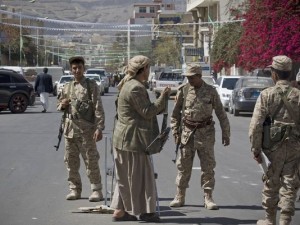
Rebels hold Yemen’s president ‘captive’
The situation in Yemen’s capital of Sanaa on Wednesday remained tense amid conflicting reports that the U.S.-backed president was being confined to his home by rebels.
Two aides told the Associated Press the Shiite Houthi rebels were holding President Abed Rabbo Mansour Hadi “captive” and that he “cannot leave his house.” The two aides, who spoke on condition of anonymity because they were not authorized to speak to media, also said the rebels removed Hadi’s guards and deployed their own fighters on the premises.
One of the advisers said the crisis is at the “point of no return,” adding the military is in shambles and the nation’s security apparatus is “crippled.”
However, Mohammed al-Bukhaiti, a member of the Houthi politburo, told Reuters that Hadi was free to leave his home. The rebels also claimed they had not toppled the president, Reuters reported.
“President Hadi is still in his home. There is no problem, he can leave,” al-Bukhaiti said.
Rebels also seized the country’s largest missile base on a hilltop above the capital, consolidating their grip on the city they seized in September. They also issued fresh demands Wednesday, asking to take leadership of the post of vice president and several key government offices.
The developments followed two days of fierce gunbattles, during which the rebels shelled the president’s neighborhood and swept into the presidential palace, looting its weapons depots. Army commander Col. Saleh al-Jamalani, who leads the Presidential Protection Force, said rebels were staging a coup.
However, there was no visible damage on the grounds of Hadi’s residence after Information Minister Nadia al-Sakkaf said the house had come under direct fire on Tuesday. Residents said the shelling targeted the presidential guards.
Authorities in Aden, the regional capital of southern Yemen, closed the country’s second-largest airport Wednesday in protest at what local authorities described as a Houthi “coup” against “national sovereignty.” Airport chief Tarek Abdu said the shutdown would last “until further notice,” following orders from the governor.
Rebel leader Abdel-Malek al-Houthi described the dramatic escalation of violence as a “revolutionary” move aimed at forcing Hadi to implement a U.N.-brokered deal that effectively grants the Houthis a bigger share of power.
Speaking to the nation late Tuesday, Al-Houthi demanded the shakeup of a commission tasked with writing a review of a new, draft constitution to ensure bigger representation for his group. The draft has proposed a federation of six regions, a move the Houthis reject.
The chaos in Sanaa prompted the U.N. Security Council to hold an emergency meeting Tuesday to condemn the violence and call for a lasting cease-fire. In a statement approved by all 15 members, the council asserted that Hadi “is the legitimate authority” in Yemen.
In Washington on Tuesday, the State Department said it is closely monitoring events, but no decision has been made on whether to close or evacuate the U.S. Embassy in Sanaa.
The government had been in delicate negotiation with the rebels when the latest violence began early Monday. Government forces and Houthi rebels traded accusations over who started the violence, which left nine dead and 67 wounded.
The destabilization threatens U.S. efforts to work with Hadi in targeting the radical Sunni al-Qaeda in the Arabian Peninsula group that controls a portion of the country.
The Houthis are believed to be allied with former president Ali Abdullah Saleh, who was ousted in 2012 after Arab Spring protests. The rebels have vowed to eradicate al-Qaeda, but are also hostile to the U.S. Their slogan is “Death to Israel. Death to America.”
The Houthis also accuse Hadi of financing and harboring al-Qaeda militants. Hadi’s government says the Houthis use the accusation as an excuse to seize more territory.
Contributing: The Associated Press





Leave a Reply